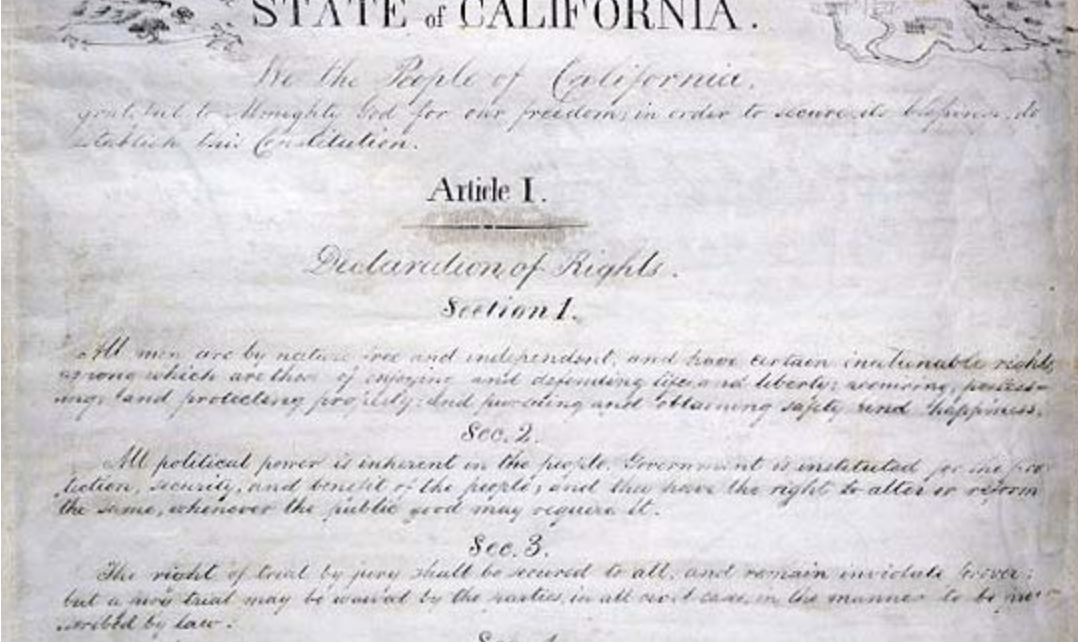
California Constitution. (Photo: www.sos.ca.gov)
Frequently Asked Questions about the Governor’s Pardon and Commutation Powers
Where is the Governor’s pardon power found?
By Chris Micheli, January 12, 2024 2:35 am
Do the federal and state chief executives have pardon power? Yes, both the United States President and California’s Governor have the power to pardon.
Where is the President’s pardon power found? The President’s pardon power is contained in Article II, Section 2, Clause 1 of the US Constitution, which provides that “The President … shall have Power to grant Reprieves and Pardons for Offenses against the United States, except in Cases of impeachment.”
Where is the Governor’s pardon power found? The Governor’s pardon power is contained in Article V, Section 8, Subdivision (a) of the California Constitution.
Are the federal and state powers granted to the chief executive the same? The President’s pardon power grants a criminal offender relief from any punishment from his or her conviction. The Governor’s pardon power is analogous.
What is a “commutation”? It is a reduction in punishment.
What is a “pardon”? It is the remission of guilt and relief from the legal consequences of the crimes.
What is a “reprieve”? It is a temporary suspension of execution of sentence.
Why is the Governor’s pardon power discretionary? Section 8(a) provides the Governor with the power to grant reprieves, pardons, and commutations, except in the case of an impeachment (similar to the federal Constitution’s limitation on the President). This authority is discretionary because the Governor’s power is “on conditions the Governor deems proper.”
When is the power granted to the Governor? The power to grant a reprieve, pardon, or commutation occurs after an offender is sentenced. This power is also subject to application procedures provided by statute.
What is the role of the Legislature? The Legislature has imposed procedures for applying; however, granting a reprieve, pardon, or commutation is entirely in the discretion of the Governor, without a role for the legislative branch of government.
What records must the Governor maintain? Under Section 12030, the Governor is required to keep a register, which includes all applications for pardon or commutation of any sentence.
Must the Governor disclose any official actions under this constitutional power? Yes, the state Constitution requires the Governor to report to the Legislature every reprieve, pardon, or commutation granted.
What information is the Governor required to disclose? In this legislative report, the Governor must state the pertinent facts and the reasons for granting the reprieve, pardon, or commutation.
Is there any obligation on other constitutional officers? Yes, pursuant to Government Code Section 12162, the Secretary of State is required to keep a register and attest to the official acts of the Governor, including any pardons issued.
Is there any limit on the Governor’s pardon power? There is one constitutional limitation on the chief executive’s pardon power: the Governor may not grant a pardon or commutation to a person who has twice been convicted of a felony, except on recommendation of a majority (4 justices in agreement) of the Supreme Court.
What is required of the California Supreme Court? The high court acts upon an application submitted by the Governor. The high court usually approves these gubernatorial requests, but it did reject a few in the past couple of years.
How have California courts viewed the Governor’s power? The Governor’s clemency power is exclusive, and the Legislature has no power to grant a reprieve, pardon, or commutation. Executive clemency is an ad hoc “act of grace” that may be granted for any reason without reference to any standards. Consistent with the separation of powers principle, pardon and commutation decisions have not traditionally been the business of courts and are rarely, if ever, appropriate subjects for judicial review. Santos v. Brown (2015) 238 Cal.App. 4th 398
- California Family Mediation and Conciliation Services - July 5, 2025
- Solemnization of Marriage in California - July 4, 2025
- Ship Managers in California - July 3, 2025






